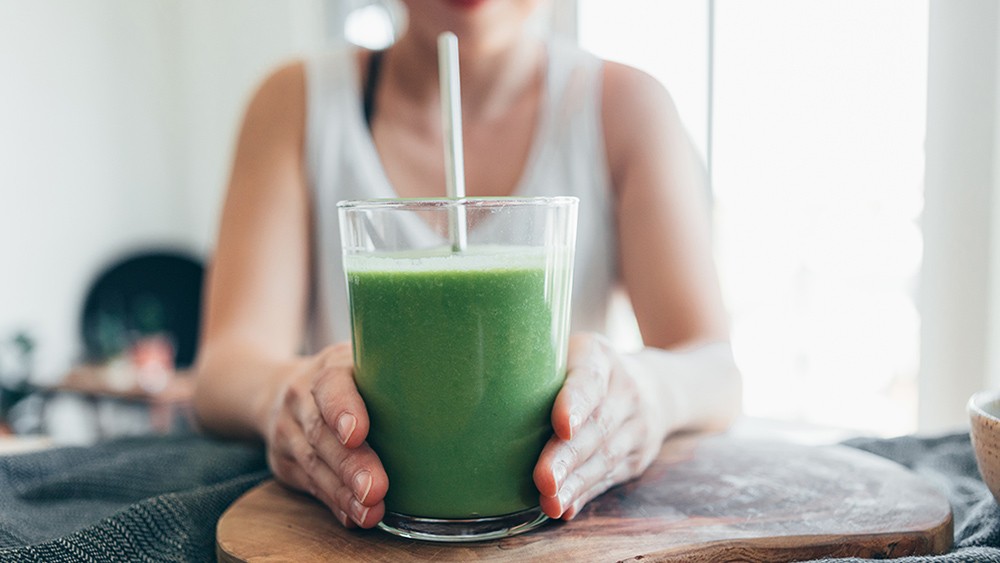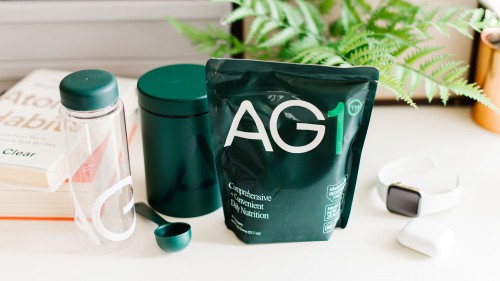8 Evidence-Based Ways to Boost Your Immunity Naturally
Published on June 9, 2021
Medically Reviewed by Anthony Dugarte, MD
Immunity deserves attention year-round, not just during cold and flu season. Fortunately, there many are evidence-based ways that you can promote your natural immune function through your lifestyle.


Immune health has not surprisingly gained more attention over the past couple of years, but your immunity is important regardless of whether it’s cold and flu season or there’s a pandemic.
While there always seems to be talk about quick ways to improve health, immunity is more of an investment in your overall daily lifestyle habits.
Not sure where to start? Let’s examine some evidence-based ways that you can support your body's natural immune defense, to keep illness and infection at bay as much as possible.
What Is the Immune System?
You probably know that your immune system is how your body responds to and manages potential threats to your health, as far as fighting off things that can make you sick.
It’s always working to help prevent or minimize the effects of illness and infection.
Your immune system is very complex and works by communicating and functioning all throughout your body. (1)
It’s made up of cells and organs that are constantly working together to identify and attack things that may be threatening.
More specifically, the function of your immune system depends on interactions between your skin, mucous membranes, bloodstream, tonsils, Peyer’s patches in the small intestine, adenoids in your nasal passage, bone marrow, lymphatic system, spleen, and thymus. (2)
The immune system learns to distinguish between normal, healthy cells and unhealthy cells.
If a “danger cue” is identified, like an infection, cellular damage, viruses, fungi, toxins, bacteria, or other pathogens, the immune defense system activates.
The two main types of immune response include innate immunity and adaptive immunity, which work synergistically throughout your life. (3)
Innate immunity is a nonspecific, general layer of immune defense that babies are born with. It helps your body identify and attack foreign bodies and invaders.
Innate immunity relies on things like your skin and mucous membranes, which are your first line of defense against things that aren’t supposed to be entering. (4)
Adaptive immunity is acquired over time as your body learns how to identify and respond to different types of germs.
For example, if you’re infected by a particular virus, your body learns how to attack it so that the next time you’re exposed to it, the effects may not be as substantial.
In other words, your body produces antibodies to various pathogens that have memories associated with how to defend you against them, also called immunologic memory.
Things That Work Against Your Immunity
We’ve all experienced seasons during which we’re more prone to illnesses. For instance, this may look like more frequent or severe bouts of colds or other viral infections.
Your susceptibility to sickness increases when your immune system is especially bogged down or perhaps not working at its best capacity.
While changes in immune function can look differently between individuals, some things that can trigger this include poor sleep quality, unmanaged mental stress, prolonged dehydration, lack of physical activity, and eating a diet of poor nutritional quality.
All of us have probably experienced at least some of the factors listed above at some point in time.
The good news is that even making a few small adjustments to your lifestyle habits can make a big improvement in your immune health.
The first step is to examine your current practices and identify some areas where you can make improvements.
Natural Ways to Support Your Immune System
We often talk about hand-washing, covering our mouth when we sneeze or cough, and sanitizing surfaces.
These practices can certainly help prevent the spread of diseases, but it’s equally important to practice habits that support your body’s natural immune defense as well.
Keeping your immune system functioning optimally is the best form of preventive health you can practice.
Here are 8 areas you might want to consider for boosting your innate immunity.
1. Get More Restful Sleep
Sleep, and having a regular circadian rhythm (wake and sleep pattern), are important factors in immunity. (5)
Not getting enough sleep has been shown to promote pro-inflammatory molecules in the body and make you more susceptible to disease. (6, 7)
While you’ve probably noticed that it’s often harder to fall asleep, and stay asleep, when you’re battling a cold, much of the healing and recovery process within your body happens while sleeping.
Plus, getting enough restful sleep has been shown to help your body fight off illness better.
How much sleep exactly? Research suggests that optimal sleep duration is between 7-9 hours, with more for children and teenagers who are still growing and developing. (8)
Not surprisingly, most of us aren’t getting enough sleep on a regular basis.
In a 2015 clinical trial in the journal Sleep, researchers looked at the relationship between sleep patterns and the likelihood of catching a common cold. (9)
The study involved 164 healthy adults and observed their experiences over 7 consecutive days.
The authors concluded that those who got fewer than six hours of sleep were more likely to catch a common cold than those who were able to get more sleep.
Put It Into Action
- Develop a sleep routine and try not to veer too far from it. Going to bed, and waking up, around the same time every day (including weekends) helps maintain a regular circadian rhythm, which your body appreciates.
- Promote better rest by creating a cozy sleep environment. This may look like light-blocking curtains, silky pillowcases, an extra soft blanket, a fan for white noise, or an eye mask.
- Minimize your blue light exposure close to bedtime, as this can suppress melatonin release from your brain and make it difficult to fall asleep. Blue light is emitted from screens, like cell phones, laptops, televisions, and iPads. Get into the habit of putting these things away 2–3 hours prior to laying down for bed. (10, 11)
2. Improve Your Stress Management Game
Short-term stress is one of your body’s most important survival mechanisms, and can even enhance your innate and adaptive immunity. (12)
On the other hand, prolonged and unmanaged stress can be harmful to your health.
It can impair your immunity by promoting inflammation and an imbalance of immune cells. (13)
Additionally, evidence shows that there’s bidirectional communication between the gut and the brain that’s directly related to the immune system. (14, 15)
In one 2017 review, researchers concluded that when stress is absent or otherwise well-managed, healthy gut bacteria produce short-chain fatty acids with antitumor, anti-inflammatory, and health-promoting effects. (16)
Oppositely, unmanaged stress changes gut bacteria in a way that promotes inflammation and impairs immunity.
Put It Into Action
- Make stress management a priority by practicing daily gratitude or positive affirmations, keeping a journal, and/or trying meditation, yoga, or deep breathing techniques.
- If you’re struggling with mental health concerns, consider speaking with a therapist who can help you work through them effectively.
- Share struggles with trustworthy friends or family members who can offer support.
3. Boost Your Fruit and Veggie Intake
Colorful fruits and vegetables in their natural form are rich in health-promoting and anti-inflammatory nutrients like vitamins, minerals, and fiber, as well as disease-fighting antioxidants and phytochemicals. (17)
The antioxidants in fruits and vegetables, like vitamin C, help protect your cells from oxidative stress that can lead to damage and disease.
Their fiber-rich nature is beneficial for your gut microbiome which, in turn, supports your immune function. (18)
In addition to eating a healthy diet full of fruits and vegetables, other whole plant foods, like legumes (beans, peas, and lentils), grains, nuts, and seeds also contain nutrients that are important for your health and immune function.
Put It Into Action
- Consider moving toward a more plant-forward diet, or at least incorporating more whole plant foods like the ones listed above into your regular routine.
- Replace meat, fish, and eggs with plant-based proteins like legumes, tofu, and nuts.
- Keep fresh produce on hand for an easy, portable snack, and frozen fruits and veggies in the freezer for a quick addition to smoothies and dinners.
4. Get Moving
Getting regular physical activity isn’t just great for your mental and physical health, but also for your immunity.
One 2015 review examined the effects of exercise on the immune system. (19)
The authors found that even a single session of activity increased the effectiveness of immunizations among people living with compromised immune systems.
Research shows that repeated bouts of strenuous exercise can actually be harmful to the immune system, so it’s important not to overdo it. (20)
One 2020 review says that moderate exercise done for up to 45 minutes has an immune-boosting effect, especially among older adults and immune-compromised individuals, whereas it’s common for high-performance athletes to experience increased infection and illness. (21)
Instead, regular activities like jogging, walking the dog, swimming, biking, dancing, or playing tennis can have anti-inflammatory effects throughout the body and promote the regeneration of immune cells.
If you don’t currently practice physical activity, think about what types of exercise are attractive to you and you’re interested in trying.
Finding something you enjoy is important to make it sustainable instead of a chore.
Put It Into Action
- Register for a social exercise event, like a mud run, a 5K, or an obstacle course that sounds exciting to you, and give yourself time to adequately train and prepare for it.
- Find a local fitness community that provides both exercise and social support. Many people find that it’s much more enjoyable to work out in the presence of others who provide mutual motivation.
- Make movement a regular part of each day. For example, getting into the habit of going for a walk after dinner or getting a good sweat first thing in the morning.
5. Eat More Fermented Foods
The link between gut health, overall health, and immunity can be further supported by eating fermented foods.
These foods are a natural source of prebiotics and probiotics that aid digestive health, promote good gut bacteria, and support natural immunity. (22)
Good gut bacteria can help your immune system differentiate between healthy, normal cells and potentially harmful invaders so it can act accordingly to keep you protected. (23)
Put It Into Action
- Incorporate natural sources of probiotics in your diet, such as fermented soy foods (tempeh, miso, natto), fermented drinks (kefir, kombucha), and fermented cabbage products (kimchi, sauerkraut).
- Consider adding a probiotic supplement to your diet that’s formulated with bacterial strains targeting digestive health and immunity.
6. Reduce Added Sugar Consumption
While you’re busy adding more fruits, vegetables, and other whole fiber- and antioxidant-rich foods into your diet, think about what types of foods you may benefit from reducing.
Added sugar runs rampant in the western food system and, although it makes food taste good, it offers no nutritional value and doesn’t support overall health or immune function.
Diets high in added sugar increase your risk for developing obesity and chronic diseases like heart disease and type 2 diabetes. (24, 25, 26)
Added sugar is known to be pro-inflammatory as well, which can weaken the immune system and make you more susceptible to illness and infection. (27)
Other research suggests that high added sugar intake alters gut bacteria in a way that promotes inflammation and reduces mucosal immunity. (28)
Sugar is often added to packaged snacks and ultra-processed foods, but it’s also found in many everyday items like condiments, vitamins, and even canned foods.
This makes it important to know how to read food labels to see if sugar has been added to them.
Also, remember that added sugar isn’t the same as natural sugars found in whole fruits and vegetables.
The sugar in fresh produce is packaged in other healthy nutrients, like vitamins, minerals, fiber, and antioxidants discussed earlier, which are also beneficial for your immunity.
Put It Into Action
- Look at your overall diet and identify areas where added sugar consumption could be reduced and replaced with natural sugars from fresh fruits and veggies.
- Substitute naturally sugar-free beverages, like carbonated water or plain water flavored with berries or lemon slices, in place of sugary beverages like juice and soda.
- Make a habit of reading nutrition and ingredient labels on packaged food items to determine whether, and how much, added sugar may be included.
7. Consider Certain Micronutrient Supplements When Sick
While the best way to get your nutrition is from whole food sources, there is some research to suggest that certain micronutrients may have immune-boosting effects.
A 2020 review published in the journal Nutrients says that vitamins C and D, and zinc, have the most evidence behind their potential immunity benefits, though more human research is needed on specific amounts and applications. (29)
Zinc can be found in a wide variety of foods, like legumes, nuts, seeds, and whole grains, and isn’t advised to be taken as supplements on a daily basis.
In fact, zinc taken in excess can cause immune disturbances. (30)
Rather, it may offer additional immune support for periods of viral illness, like the common cold. (31)
Interestingly, vitamin D has gained more attention recently in regards to its role in immunity. (32)
In fact, adequate vitamin D levels appear important for innate and adaptive immunity to work cohesively.
Vitamin D deficiency is common worldwide and has been linked to a higher risk for infection and illness. (33, 34)
Put It Into Action
- Prioritize whole food sources for the most nutritional benefit, but consider supplemental zinc during bouts of illness or infection.
- Vitamin D deficiency is common and linked to an increased susceptibility to illness and infection. Get your vitamin D levels checked by your doctor to determine whether a daily supplement would be beneficial for you.
- Vitamin C is one of the best-known immune support vitamins. The best way to boost your vitamin C is to eat lots of fruits and vegetables, aiming for 5+ per day. Nearly all plants are a rich source of this vitamin.
8. Stay Hydrated
Water is essential for survival and making sure your body can conduct its everyday functions. (35)
Not getting enough leads to dehydration, which can increase your susceptibility to illness and infection. (36)
In a 2014 comparative study among 25 female judo athletes, researchers observed that dehydration among athletes led to suppressed immunity and reduced function of neutrophils, white blood cells involved in immune response. (37)
Don’t wait until you’re thirsty to drink water. Instead, sip water throughout the day to stay hydrated.
A good tip is to observe the color of your urine. A pale yellow color indicates optimal hydration, whereas clear urine is overhydrated, and dark yellow or orange urine says you’re dehydrated.
Put It Into Action
- Fill a portable water bottle each night and store it in the fridge to easily grab in the morning for your day.
- If you get tired of drinking plain water, you can add lemon or cucumber slices, or even fresh raspberries, to give it some natural flavor. Another option is buying carbonated water that doesn’t contain added sugar or artificial sweeteners, or purchasing a home water carbonation machine.
The Bottom Line
Immunity is the natural defense system of your body, and there are many preventive health habits that help keep it working optimally.
Some of these include eating a healthy diet low in added sugar and rich in whole plant foods, improving your sleep quality, practicing stress management, getting regular physical activity, and staying hydrated.
Practicing habits that support your immunity are important all year round, not just during times when the risk for spreading illness and infection may be higher.
At WellnessVerge, we only use reputable sources, including peer-reviewed medical journals and well-respected academic institutions.
- Overview of the Immune System:
https://www.niaid.nih.gov/research/immune-system-overview - The Immune System:
https://www.hopkinsmedicine.org/health/conditions-and-diseases/the-immune-system - An introduction to immunology and immunopathology:
https://aacijournal.biomedcentral.com/articles/10.1186/1710-1492-7-S1-S1 - Innate antimicrobial immunity in the skin: A protective barrier against bacteria, viruses, and fungi:
https://journals.plos.org/plospathogens/article?id=10.1371/journal.ppat.1007353 - Sleep and immune function:
https://pubmed.ncbi.nlm.nih.gov/22071480/ - Sleep and innate immunity:
https://pubmed.ncbi.nlm.nih.gov/21196401/ - Human immune system during sleep:
https://pubmed.ncbi.nlm.nih.gov/29348984/ - Sleep Duration and Cardiovascular Health in a Representative Community Population (from NHANES, 2005 to 2016):
https://pubmed.ncbi.nlm.nih.gov/32466847/ - Behaviorally Assessed Sleep and Susceptibility to the Common Cold:
https://pubmed.ncbi.nlm.nih.gov/26118561/ - Systematic review of light exposure impact on human circadian rhythm:
https://pubmed.ncbi.nlm.nih.gov/30311830/ - Harvard Medical School: Blue light has a dark side:
https://www.health.harvard.edu/staying-healthy/blue-light-has-a-dark-side - Effects of stress on immune function: the good, the bad, and the beautiful:
https://pubmed.ncbi.nlm.nih.gov/24798553/ - Chronic stress, glucocorticoid receptor resistance, inflammation, and disease risk:
https://pubmed.ncbi.nlm.nih.gov/22474371/ - The mucosal immune system: master regulator of bidirectional gut-brain communications:
https://pubmed.ncbi.nlm.nih.gov/28096541/ - The Gut's Little Brain in Control of Intestinal Immunity:
https://pubmed.ncbi.nlm.nih.gov/23691339/ - The Effects of Stress and Meditation on the Immune System, Human Microbiota, and Epigenetics:
https://pubmed.ncbi.nlm.nih.gov/29306937/ - Functional Foods for Health: The Interrelated Antioxidant and Anti-Inflammatory Role of Fruits, Vegetables, Herbs, Spices and Cocoa in Humans:
https://pubmed.ncbi.nlm.nih.gov/27881064/ - Dietary fiber and prebiotics and the gastrointestinal microbiota:
https://pubmed.ncbi.nlm.nih.gov/28165863/ - Exercise and the Regulation of Immune Functions:
https://pubmed.ncbi.nlm.nih.gov/26477922/ - Exercise and the immune system:
https://pubmed.ncbi.nlm.nih.gov/17826186/ - Can exercise affect immune function to increase susceptibility to infection?:
https://pubmed.ncbi.nlm.nih.gov/32139352/ - One Health, Fermented Foods, and Gut Microbiota:
https://pubmed.ncbi.nlm.nih.gov/30513869/ - The role of gut microbiota in immune homeostasis and autoimmunity:
https://www.ncbi.nlm.nih.gov/pmc/articles/PMC3337124/ - The role of gut microbiota in immune homeostasis and autoimmunity:
https://pubmed.ncbi.nlm.nih.gov/28507007/ - Innate immunity and the failing heart: the cytokine hypothesis revisited:
https://pubmed.ncbi.nlm.nih.gov/25814686/ - A high-sugar diet affects cellular and humoral immune responses in Drosophila:
https://pubmed.ncbi.nlm.nih.gov/29727694/ - A Review of Excessive Sugar Metabolism on Oral and General Health:
https://pubmed.ncbi.nlm.nih.gov/29181456/ - High Intake of Sugar and the Balance between Pro- and Anti-Inflammatory Gut Bacteria:
https://pubmed.ncbi.nlm.nih.gov/32397233/ - A Review of Micronutrients and the Immune System-Working in Harmony to Reduce the Risk of Infection:
https://pubmed.ncbi.nlm.nih.gov/31963293/ - Zinc Signals and Immunity:
https://pubmed.ncbi.nlm.nih.gov/29064429/ - The Role of Zinc in Antiviral Immunity:
https://pubmed.ncbi.nlm.nih.gov/31305906/ - Vitamin D and immune function: an overview:
https://pubmed.ncbi.nlm.nih.gov/21849106/ - Is vitamin D deficiency a major global public health problem?:
https://pubmed.ncbi.nlm.nih.gov/24239505/ - Vitamin D and the Immune System:
https://www.ncbi.nlm.nih.gov/pmc/articles/PMC3166406/ - Effect of Increased Daily Water Intake and Hydration on Health in Japanese Adults:
https://pubmed.ncbi.nlm.nih.gov/32340375/ - Water, Hydration and Health:
https://www.ncbi.nlm.nih.gov/pmc/articles/PMC2908954/ - Effects of dehydration on immune functions after a judo practice session:
https://pubmed.ncbi.nlm.nih.gov/22362640/





